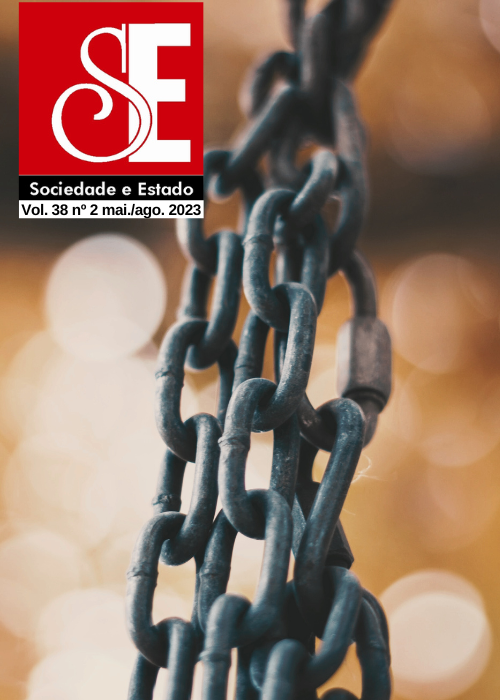Factores de riesgo para la radicalización: Estudio de revisión sobre evidencia internacional
DOI:
https://doi.org/10.1590/s0102-6992-e47232Palabras clave:
Radicalización, Extrema derecha, Factor de riesgo, Política Pública, PrevenciónResumen
El artículo presenta, con base en la literatura especializada, algunos de los conceptos centrales para el debate sobre los procesos de radicalización política, ofreciendo un panorama de la evidencia encontrada en revisiones sistemáticas sobre factores de riesgo del fenómeno. El tema es particularmente relevante dadas las continuas amenazas a la democracia en varios países, incluido Brasil, en particular por las acciones de grupos de extrema derecha. Seleccionamos para su examen las cinco revisiones sistemáticas publicadas en inglés por la plataforma Google Scholar, en los últimos 10 años, mejor clasificadas según los criterios bibliométricos del software Publish or Perish (PoP). A pesar de las diferencias metodológicas de las revisiones examinadas y la presencia de factores de riesgo ya identificados por los estudios criminológicos contemporáneos, los estudios también encontraron factores de riesgo propios de los procesos de radicalización, lo que actualiza la necesidad de construir una agenda de investigación latinoamericana sobre el tema.
Descargas
Citas
ABBAS, Thair et al. The Buffalo Attack - an analysis of the Manifesto. International Centre for Counter-Terrorism (ICCT), 2022. Disponível em: <https://www.icct.nl/publication/buffalo-attack-analysis-manifesto>.
» https://www.icct.nl/publication/buffalo-attack-analysis-manifesto
BLAZAK, Randy. Isn’t every crime a hate crime? The case for hate crime laws. Sociology Compass, v. 5, n. 4, p. 244-255, 2011.
BORUM, Randy. Radicalization into violent extremism I: a review of social science theories. Journal of Strategic Security, v. 4, n. 4, p. 7-36, 2011.
CARTER, Elizabeth. Right-wing extremism/radicalism: reconstructing the concept. Journal of Political Ideologies, v. 23, n. 2, p. 157-182, 2018.
DELLA PORTA, Donatella. Leaving underground organizations: a sociological analysis of the Italian case. In: BJØRGO, Tore; HORGAN, John (eds.). Leaving terrorism behind: individual and collective disengagement, p. 66-87. New York: Routledge, 2008.
DZHEKOVA, Rosita et al. Monitoring radicalisation: a framework for risk indicators. Sofia: Center for the Study of Democracy, 2017.
EMMELKAMP, Julie et al. Risk factors for (violent) radicalization in juveniles: a multilevel metaanalysis. Aggression and Violent Behavior, n. 55, p. 1-16, 2020.
EMPOLI Giuliano Da. Os engenheiros do caos. São Paulo: Vestígio, 2019.
FARRINGTON, David P. Explaining and preventing crime: the globalization of knowledge - the American Society of Criminology 1999 presidential address. Criminology, v. 38, n. 1, p. 1-24, 2000.
FRANC, Renata; PAVLOVIĆ, Tomislav. Systematic review of quantitative studies on inequality and radicalisation. Dialogue about radicalisation and equality. Systematic Review, 2018.
GALVÃO, Taís Freire; PEREIRA, Maurício Gomes. Revisões sistemáticas da literatura: passos para sua elaboração. Epidemiologia e Serviços de Saúde, v. 23, n. 1, p. 183-184, 2014.
GILL, Paul. Foreword. In: KOEHLER, Daniel. Right-wing terrorism in the 21st century: the “National Socialist Underground” and the history of terror from the far-right in Germany. New York, Routledge, 2017.
GILL, Paul; CLEMMOW, Caitlin; HETZEL, Florian; ROTTWEILER, Bettina; SALMAN, Nadine; VAN DER VEGT, Isabelle; MARCHMENT, Zoe; SCHUMANN, Sandy; ZOLGHADRIHA, Sanaz; SCHULTEN, Norah; TAYLOR, Helen; CORNER, Emily.. Systematic review of mental health problems and violent extremism. The Journal of Forensic Psychiatry & Psychology, v. 32, n. 1, p. 51-78, 2021.
HEMMINGBY, Cato; BJØRGO, Tore. Terrorist target selection: the case of Anders Behring Breivik. Perspectives on Terrorism, v. 12, n. 6 p. 164-176, 2018.
HORGAN, John G. From profiles to pathways and roots to routes: perspectives from psychology on radicalization into terrorism. The Annals of the American Academy of Political and Social Science, n. 618, p. 80-94, 2008.
HORGAN, John G.; BRADDOCK, Kurt. Rehabilitating the terrorists? Challenges in assessing the effectiveness of de-radicalization programs. Terrorism and Political Violence, v. 22, n. 2, p. 267-291, 2010.
KIRBY, Paul. O plano de golpe da extrema direita que levou 25 pessoas à prisão na Alemanha. BBC News, 7 dez. 2022. Disponível em: <https://www.bbc.com/portuguese/internacional-63886883>. Acesso em: 05 jan. 2023.
» https://www.bbc.com/portuguese/internacional-63886883
KOEHLER, Daniel. Violence and terrorism from the far-right: policy options to counter an elusive threat. Amsterdã: International Centre for Counter-Terrorism; ICCT Policy Brief, 2019.
______. Right-wing terrorism in the 21st century: the “National Socialist Underground” and the history of terror from the far-right in Germany. New York: Routledge, 2017.
KOEHLER, Daniel; FIEBIG, Verena. Knowing what to do: academic and practitioner understanding of how to counter violent radicalization. Perspective on Terrorism, v. 13, n. 3, p. 44-62, jun. 2019.
KURZMAN, Charles; SCHANZER, David. The growing right-wing terror threat. New York: New York Times, 2015.
LÖSEL, Friedrich et al. Protective factors against extremism and violent radicalization: a systematic review of research. International Journal of Developmental Science v. 1, n. 2, p. 1-14, 2018.
LOWE, David. Christchurch terrorist attack, the far-right and social media: what can we learn? The New Jurist, Leeds Back University, 2019.
MACHADO, Ana Sofia Monteiro; GRANGEIA, Rosa. Terrorismo, radicalização e psiquiatria. PsiLogos, v. 17, n. 1-2, p. 65-77, 2019.
MACKLIN, Graham. The Christchurch Attacks: Livestream Terror in the Viral Video Age. Combating Terrorism Center at West Point. CTC Sentinel, v. 12, n. 6, 2019.
MARWICK, Alice; CLANCY, Benjamin; FURL, Katherine. Far-right online radicalization: a review of the literature. The Bulletin of Technology & Public Life, maio 2022.
MICHAEL, George. This is war! Tom Metzger, white aryan resistance and the lone wolf legacy”. In: MORGAN, Joshua B. (ed.), Focus on Terrorism, v. 14, p. 29-62, 2016.
______. Leaderles resistance: the new face of terrorism. Defence Studies, v. 12, n. 2, p. 257-282, 2012.
MILLER-IDRIS, Cynthia. Hate in the homeland: the new global far-right. Princeton, NJ: Princeton University Press, 2020.
PESQUISA ATLAS. Invasão do Congresso, do STF e do Planalto, Brasília: Atlas Intel, 2023. Disponível em: <https://static.poder360.com.br/2023/01/Pesquisa_Atlas_Invasao_do_Congresso_do_STF_e_do_Planalto_08_09.pdf>. Acesso em: 10 de jan. 2023.
PRADO, Michele. Tempestade ideológica: bolsonarismo, a alt-right e o populismo iliberal no Brasil. São Paulo: Lux, 2021.
RABASA, Angel et al. Deradicalizing islamist extremists. Santa Monica, CA: Rand Corporation, 2010.
RATHJE, Jan. Driven by conspiracies: the justification of violence among “reichsbürger” and other conspiracy-ideological sovereignists in contemporary Germany. Perspective on Terrorism, v. 16, n. 6, p. 49-61, dez. 2022.
RINK, Ancelm; SHARMA, Kunaal. The determinants of religious radicalization: evidence from Kenya. Journal of Conflict Resolution, v. 62, n. 6, p. 1229-1261, 2018.
ROCHA, João Cezar de Castro. Guerra cultural e retórica do ódio: crônicas de um Brasil pós-político. Goiânia: Caminhos, 2021.
ROSSI, Amanda; RODRIGUES, Lúcia V. Preparação para ato golpista teve mapa online e previu confronto violento. UOL São Paulo, jan. 2023. Disponível em: <https://noticias.uol.com.br/politica/ultimas-noticias/2023/01/11/mapa-online-onibus-brasilia-ato-golpista-8-janeiro-preparacao-confronto.htm>. Acesso em: 12 jan. 2023.
SEDGWICK, Mark. The concept of radicalization as a source of confusion. Terrorism and Political Violence, n. 22, p. 479-494, 2010.
SCHMID, Alex P. The literature on terrorism. In: SCHMID, Alex (ed.), The Routledge handbook of terrorism research, p. 457-474. New York: Routledge, 2011.
TEITELBAUM, Benjamin R. Guerra pela eternidade: o retorno do Tradicionalismo e a ascensão da direita populista. Campinas, SP: Editora Unicamp, 2020.
VERGANI, Matteo et al. The three Ps of radicalization: push, pull and personal. A systematic scoping review of the scientific evidence about radicalization into violent extremism. Studies in Conflict & Terrorism, v. 43, n. 10, 2018.
WARE, JACOB. Testament to murder: the violent far-right’s increasing use of terrorist manifestos. Amsterdam: International Centre for Counter-Terrorism, ICCT Policy Brief, 2020.
WOLFOWICZ, Michael et al. What is the state of the quantitative literature on risk factors for radicalization and recruitment to terrorism? In: WEISBURD, Davidet al. (ed.). Understanding recruitment to organized crime and terrorism. Annapolis, MD: Maryland University Press, 2020.
YOUNGBLOOD, Mason. Extremist ideology as a complex contagion: the spread of far-right radicalization in the United States between 2005 and 2017. Humanities and Social Sciences Communications, v. 7, n. 49, 2020.
Descargas
Publicado
Cómo citar
Número
Sección
Licencia
Derechos de autor 2023 Sociedade e Estado

Esta obra está bajo una licencia internacional Creative Commons Atribución-NoComercial 4.0.




.jpg)



















